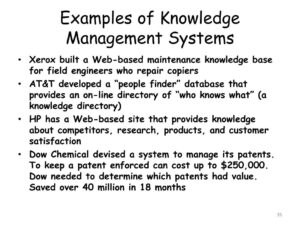Examples of Knowledge Management Systems
Knowledge Management Systems
There are many different examples of knowledge management systems. Some are simpler than others. Some of the most effective systems include a drag-and-drop editor, powerful search, user permissions, comments, and custom branding. Here are a few examples. One is Optimizely. This digital experience platform has a knowledge center with 5 main categories and hundreds of articles. Users can easily scan the content to find information that they need.
Another example is Tableau, which offers a KM Solution where employees can ask questions and get answers. There are also webinars and e-learning courses available for the software. The Tableau Knowledge Community is another great example of a knowledge management system. Members can submit questions and access articles pertaining to common customer service problems. This is a useful tool for project collaboration and sprint planning. It costs $6 per user per month on a monthly basis, and you can try it for 14 days free.
Another example is an online customer support portal. An online knowledge management system makes it easy for customers to find answers. Studies show that over 40% of customers prefer self-service customer support, which is often the most cost-effective method of customer support. An example of a self-service customer support portal includes FAQs, videos, tutorials, and publications. These tools can help customers get the information they need without spending a fortune on customer support.

Examples of Knowledge Management Systems
An online knowledge management system can help organizations innovate and deliver products in the market. Ideas can be collected, stored, and enriched through a knowledge management system. Using the system will also give users a breadcrumb trail for other users, which will create better ideas. The more knowledge an organization has, the more innovative and successful it will be. And with a knowledge management system, it’s easy to find answers to questions, and this is a great way to improve customer service.
Knowledge management systems make large volumes of organizational-wide data accessible. They can create multiple knowledge bases and offer customization options. Since they are web-based, users don’t have to learn how to use code and can update content with just a few clicks. Most knowledge management systems come with an advanced search engine, which helps employees collaborate more effectively. They can also be password-protected for privacy and security. Then, they’re ready to answer the questions of their customers.
Creating a knowledge management system can be a complicated process. But there are many free examples of such systems. With Nuclino, for example, a knowledge management system offers a unified workspace for teams and can be customized by users without any technical knowledge. It also has an extensive customization feature and full customization capabilities. Its free version, however, is not open to the public, which makes it a great tool for organizations of all sizes.